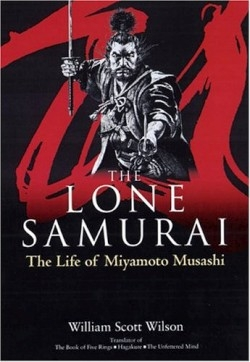The Lone Samurai
The Life of Miyamoto Musashi
Sasaki Kojiro was a famed swordsman, the pinnacle of an ancient line of traditional samurai warriors who sought mastery of all fighting techniques. He stood on the shores of a tiny island in April 1612, awaiting his opponent, who was also undefeated. Kojiro, dubbed the “Demon of the Western Provinces” for his skill with the blade, impatiently fingered the extra-long sword he favored, waiting for the foolish man who dared to challenge him.
Eventually, from a small boat stepped his opponent, and Kojiro’s eyes narrowed in rage at the man’s choice of weapon. The man chose to fight him not with a legitimate blade, but instead brandished a wooden sword, which he had just carved from an oar! Kojiro unsheathed his weapon and dramatically threw the scabbard in the water in disdain. The other man smiled and uttered his now-famous words, “You’ve lost, Kojiro. Would the winner throw away his scabbard?”
The inflamed Kojiro rushed forward and slashed his sword down at the other’s forehead. At the same moment, his opponent countered with a similar blow. The wooden sword was slightly longer than Kojiro’s blade, and Kojiro fell from the blow to his head. The crude weapon struck again with massive force, and Kojiro lay dead.
Miyamoto Musashi bowed to the verifying officials and jumped back into the boat, the victor in the most famous fight of his life, one that is vigorously discussed three hundred and fifty years later.
Musashi was the greatest swordsman of his age, and perhaps of all time. While only thirteen years old, he killed his first opponent, a fully-grown samurai. By the age of thirty, he had fought in over sixty personal combats and several wars, and he never was defeated. He then wrote a famous book on swordsmanship, which is still widely read today. Musashi is one of the premier heroic figures in Japanese history, revered not only as a superb swordsman and master strategist, but also as a Zen philosopher, an incomparable artist, and a fiercely independent “free spirit.”
The author, who travels often to Japan and has translated many classic samurai texts, including Musashi’s famed The Book of Five Rings, combines many anecdotes about Musashi with excerpts of his writings to imbue him with a vibrancy lacking from more sedate treatments of this complex individual. The author is as skilled with wordplay as Musashi was with the sword, and he has exhaustively researched his subject. The book is a compelling journey through seventeenth-century Japanese society, replete with numerous footnotes and a glossary to aid the reader with the referenced Japanese terms and locales.
Anyone interested in the martial arts or Japanese history will enjoy this superb biography of the “lone samurai” who owed allegiance to no man, but only to his adventurous spirit.
Reviewed by
Alan J. Couture
Disclosure: This article is not an endorsement, but a review. The publisher of this book provided free copies of the book to have their book reviewed by a professional reviewer. No fee was paid by the publisher for this review. Foreword Reviews only recommends books that we love. Foreword Magazine, Inc. is disclosing this in accordance with the Federal Trade Commission’s 16 CFR, Part 255.

